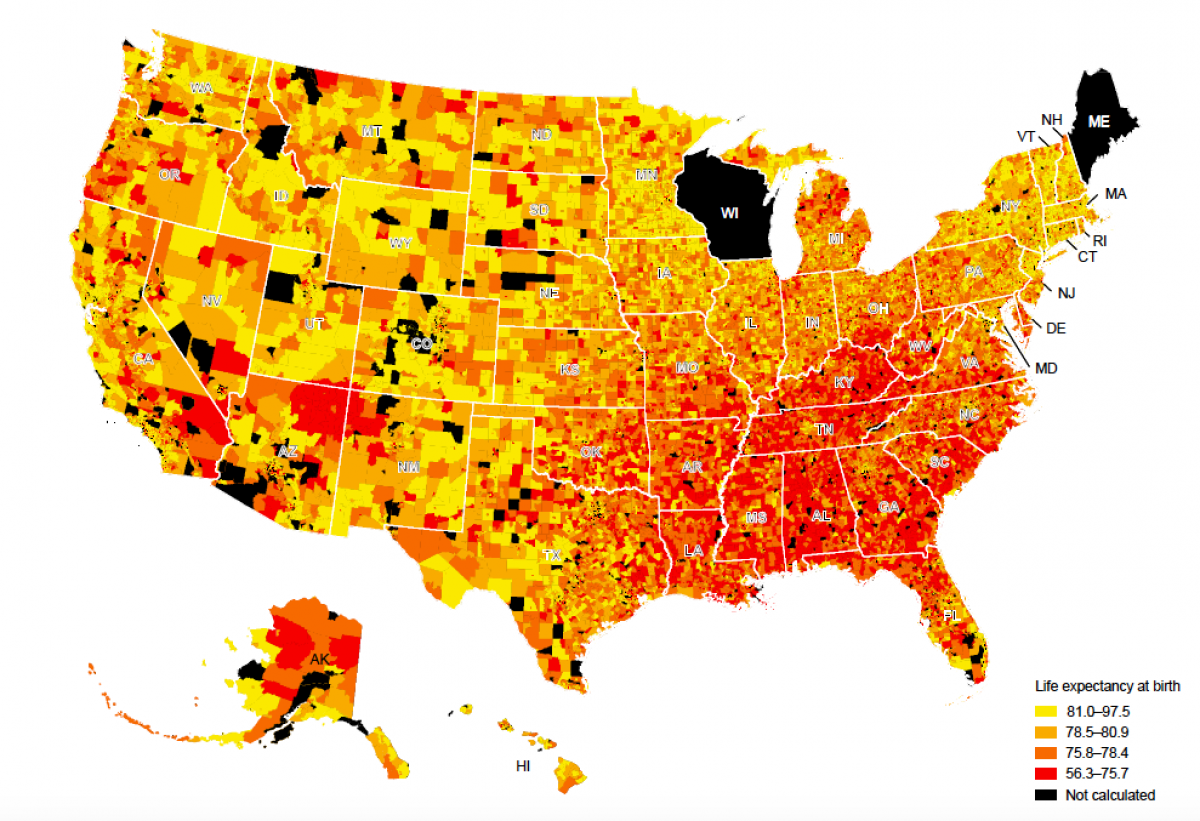Throughout the United States, life expectancy varies, with people in some states living far longer on average than people in others.
In a newly released project, researchers from the Centers of Disease Control and Prevention's National Center for Health Statistics partnered with the National Association for Public Health Statistics and Information Systems and Robert Wood Johnson Foundation to determine just how different life expectancy can be in one nation. The groups created the U.S. Small-area Life Expectancy Estimates Project, called USALEEP, to measure the health of areas in the country.
"This is the first measure of health at a neighborhood level for every neighborhood," Don Schwarz, the senior vice president at the Robert Wood Johnson Foundation told Newsweek on Tuesday. "It represents the measure of opportunity for a long life that we give every child in every neighborhood in this country."
The researchers were able to determine the life expectancy at birth from 2010–2015 with the National Vital Statistics System. They gathered death records of U.S. residents from 2010 through 2015 in each state except for Maine and Wisconsin, who didn't have enough years of geocoded death records. The scientists then assigned the deaths to different areas of the country based on their residential addresses.
"We've known for some time that people with higher education or higher income have higher life expectancy, lower mortality, and generally better health than persons with lower resources, such as lower education and lower income," Elizabeth Arias, director of the U.S. Life Table Program at the Centers for Disease Control and Prevention and an author on the study, told Newsweek.
Overall, the life expectancy in the U.S. was 78.7 years, according to the final data. The life expectancy differed between men and women: Nationally for men, life expectancy is 76.3 years while women live an average of 81.2 years.
The Robert Wood Johnson Foundation created a calculator in which a location can be entered to determine the life expectancy of that area.
The area with the lowest life expectancy was Stilwell, Oklahoma, where the average expectancy was 56.3 years old. Compared to the national average, that is 22.4 years earlier. Stilwell has the highest concentration of Cherokee people in the country. In Stilwell, 42.2 percent of people are Cherokee and 49.0 percent of people are Native American.
Places that were in the bottom 25 percent of life expectancy had four things in common. The majority of the people were less educated, incomes were in the bottom 25 percent, populations were predominantly black, and locations were in the south.

However, the area with the highest life expectancy was also in the south: Chatham, North Carolina. At 97.5 years, the life expectancy there was 41.2 years longer than in Stilwell. This area is of higher income and is in the university-centric area of Durham-Chapel Hill.
"We were surprised at the breadth of difference," Schwarz told Newsweek. "We did this not so much to see the difference ourselves, but to help people in communities and cities and states across the country have the ability to see the differences within their jurisdiction."
Uncommon Knowledge
Newsweek is committed to challenging conventional wisdom and finding connections in the search for common ground.
Newsweek is committed to challenging conventional wisdom and finding connections in the search for common ground.
About the writer
To read how Newsweek uses AI as a newsroom tool, Click here.








